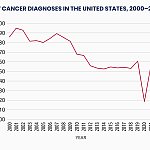
Erythritol is a sugar alcohol widely used as a noncaloric sweetener in sugar-free products, such as keto-friendly snack bars, energy drinks, and sugar-free chewing gum.
It has been approved as a food additive in the United States since 2001 and marketed as a healthy sugar alternative for individuals trying to lose weight or manage their blood sugar levels.
Despite its popularity, there have been growing concerns about the safety of erythritol and its potential side effects on human health.
Recent research proposes a link between higher levels of erythritol in the blood and an increased risk of heart attack or stroke. This may be partly due to increased blood clot formation.
Now, a new cell study further indicates that the amount of erythritol found in a single beverage serving may negatively impact brain and blood vessel health.
The findings suggest it increases oxidative stress and reduces nitric oxide production in brain blood vessel cells, which may impair blood flow, contributing to a higher risk of vascular events like stroke.
The study abstract was presented at the 2025 American Physiology Summit (APS2025), April 24–27, 2025, in Baltimore, MD.
“We expect [the study to] be published in the Journal of Applied Physiology in the coming months,” Auburn Berry, MS, first author of the study and a graduate student in integrative physiology at the University of Colorado Boulder, told Medical News Today.
Researchers at the Integrative Vascular Biology Laboratory, University of Colorado Boulder, investigated how erythritol affects oxidative stress and nitric oxide production in brain blood vessel cells.
In the lab, they exposed human brain blood vessel cells to an erythritol solution containing roughly the same amount found in a single can of artificially sweetened beverage (about 30 grams). The cells were left in this solution for 3 hours.
They found that exposing cells to the amount of erythritol found in a single beverage serving caused significantly higher levels of oxidative stress compared to untreated cells.
Specifically, cells exposed to erythritol produced nearly 100% more reactive oxygen species, which are a type of free radicals, compared to untreated cells.
Levels of two key antioxidant enzymes also increased in the erythritol-treated cells, suggesting the cells were responding to the extra oxidative stress. Additionally, the erythritol-treated cells produced less nitric oxide.
The study’s authors note that this increased oxidative stress and reduced nitric oxide levels may contribute to the heightened risk of vascular diseases and events like stroke linked to erythritol.
Erythritol may negatively impact brain and blood vessel health by directly interfering with cellular processes, according to experts.
Berry told MNT that erythritol disrupts the production of nitric oxide, a molecule that is essential for blood vessels to relax and widen (dilate) as needed for proper blood flow.
Erythritol does so “by interfering with a key activation step in the cells, making them less effective at producing [nitric oxide],” said Thomas M. Holland, MD, MS, a physician-scientist and assistant professor at the RUSH Institute for Healthy Aging, RUSH University, College of Health Sciences, who was not involved in the study.
This reduced nitric oxide can impair blood vessel function, disrupt circulation, and potentially cause neurovascular damage, he explained.
Holland stated that this decreased nitric oxide could also add to oxidative stress, but “the main driver of oxidative stress in this case is likely the direct impact erythritol has on the cells’ oxidative balance.”
“Erythritol triggers a surge in harmful molecules called reactive oxygen species (ROS), which cause cellular damage. Of particular concern is when these reactive oxygen species cause damage to neural tissue, which can lead to increased rates of cognitive decline. Similarly, ROS’s can cause damage in various organ systems leading to a slew of disease processes. The body tries to defend against this by increasing its internal antioxidant defenses, but the elevated stress remains.”
— Thomas M. Holland, MD, MS
Both experts noted that these cellular effects—reduced nitric oxide production and elevated oxidative stress—are consistent with early events in vascular diseases, including thrombosis and strokes.
Holland pointed out that while these findings are based on lab studies and may not fully replicate human physiology, they align with prior clinical observations linking erythritol to an increased risk of stroke and cardiovascular events.
Holland commented that “this study offers valuable insights into the potential risks of erythritol on brain blood vessel health, especially for people seeking to improve or protect their vascular and cognitive function.”
“The findings challenge the perception of erythritol as a harmless sugar substitute and underscore the need for moderation, particularly in those with risk factors for vascular disease,” he cautioned.
Berry agreed that individuals concerned about heart or brain health should consider limiting their intake, warning that “regular erythritol consumption may impair blood vessel health and function.”
She stated that “the most important point of our study is that non-nutritive sweeteners, in this case erythritol, can have negative health effects.”
“Based on our cell studies and recent clinical studies, people should be conscious of the amount of erythritol they are consuming on a daily basis,” she emphasized.
Instead of erythritol and other artificial sweeteners, Holland advised opting for more natural options, such as honey or fruit-based sweeteners like date syrup. These can provide antioxidants when used sparingly, though they still impact blood sugar, he noted.
For noncaloric sweeteners, he said, “stevia and monk fruit extract are wonderful and appear to be safer choices for now, as they don’t appear to have the same adverse effects on oxidative stress or blood vessel health.”
However, “reducing overall reliance on sweeteners and focusing on whole foods is likely the most effective path for long-term brain and vascular health,” he concluded.





